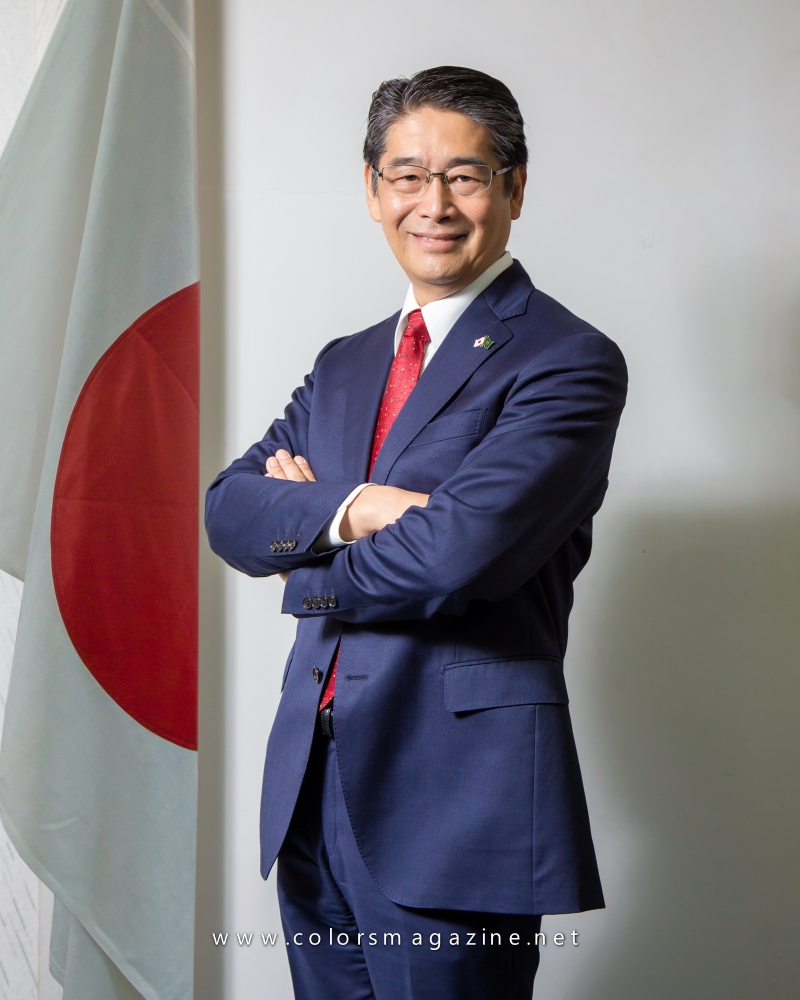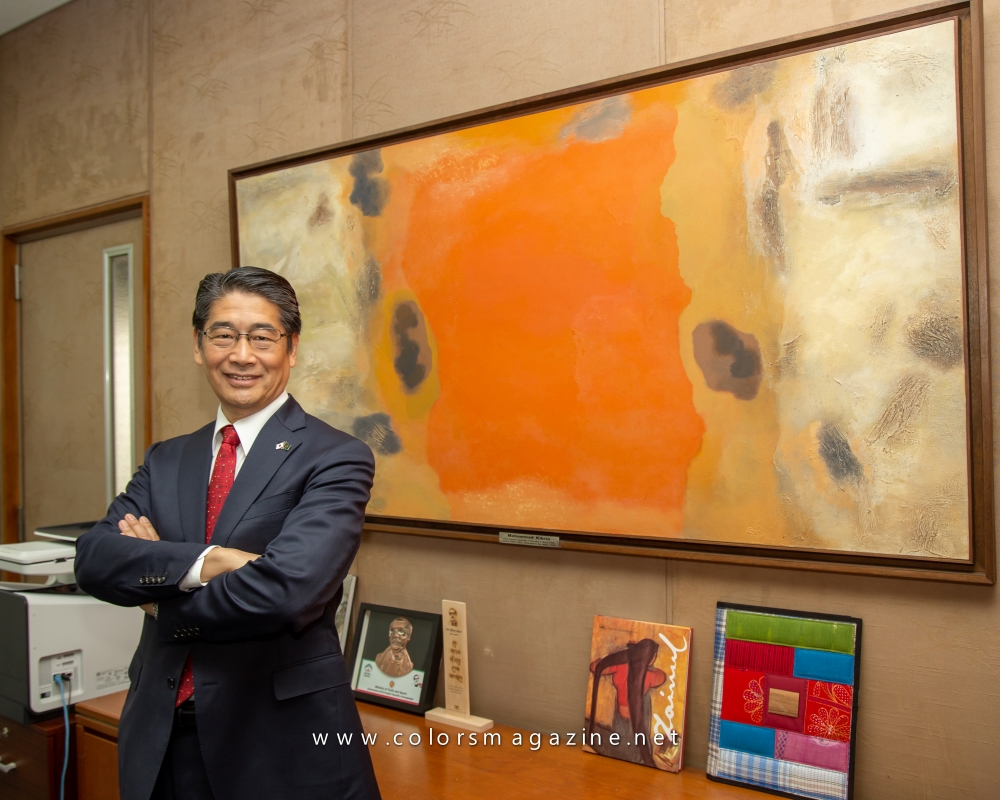From Japan with Love
Ambassador ITO Naoki rediscovers Japanese ethos in Bangladeshi fish, culture, and linguistic nationalism
He has been fascinated by warmness of Bangladeshis, or Bangla hospitality though a little bit intrusive. As the Japanese Ambassador in Dhaka, ITO Naoki finds Bangladesh’s fish-eating culture homely and also relieving from the stress of traffic congestion. In an interview with Colors’ Ziaul Karim, the diplomat details how the Japan-Bangladesh cooperation could reach a different height with cultural exchange by 2022, the year which marks 50 years of their diplomatic relations.

Bangladesh has the scope to connect itself with the Southeast Asian market and construction of Matarbari seaport in Maheshkhali, Cox’s Bazar, could establish the country as a regional hub, says Ambassador ITO Naoki as he is proud of being a key development partner of Bangladesh in its economic journey, especially building infrastructures that can attract foreign investment. ‘I think Bangladesh should make most of the strategic position which this country holds, particularly when Matabari is developing, that will be a game-changer for the economy of this country. I think that should be bound to connect Bangladesh with ASEAN (Association of South East Asian Nations) and beyond,’ he observes and predicts that the middle of this decade would be a critical period when Bangladesh would be much closer to the regional supply chain. That is the time, he points out, a number of infrastructure projects such as Dhaka Metro Rail, Terminal 3 of Shahjalal International Airport, Dhaka, and power stations, supported by Japan, would be completed.
‘Our hope is that in line with the development of the projects, the relations in other areas and investment climate [in Bangladesh] will improve, so that increasing number of Japanese companies will be ready to come to operate here, ready to make investment by 2024,’ he notes. Ambassador ITO Naoki, who began his Bangladesh assignment in late 2019, has all euphoria that the two countries are set to celebrate their 50 years of diplomatic relations in 2022, immediately after centennial birth anniversary of Bangabandhu Sheikh Mujibur Rahman (Mujib Barsha 2020) and Golden Jubilee of Bangladesh’s independence in 2021. ‘It’s like a triple jump – 2020, 2021 and 2022.’
The Japanese diplomat has his conviction that it is important to see development aspects in every way, not merely from economic point of view – high-level contact, cultural exchanges, people-to-people contacts, interactions between grassroots players, academic exchange and artistic exchange and so on. He would focus on holistic relations during the 50th anniversary of diplomatic relations. ‘I really hope that 2 years from now we will see the exchange of artists and singers or those who have very strong appeal to the people of both sides, especially among young people,’ he adds. The diplomat would also encourage translation of Japanese literary pieces and participation of more Japanese artists and litterateurs in festivals in Bangladesh in the coming days.
Since the beginning of his assignment in Bangladesh, ITO Naoki started visiting various parts of the country including Barishal, Tangail, and also Cox’s Bazar where more than one million displaced Myanmar nationals of Rohingya ethnic minorities are living. For acclimatizing with the situation, he did not struggle much. ‘I think finding your favorite food in a foreign country is very, very important for you to feel comfortable in a different environment… I found that this country has a fish-eating culture and that’s something common between Bangladeshi and Japanese people. I think that’s a really wonderful part. Because of that I don’t feel any difficulty in trying Bangladeshi food,’ he recalls.

The envoy mentions that while visiting Barishal, he tried local fish curry, which, he says, ‘was very tasty and also the small fish fry of Bangladesh was good, too. I was happy to try them’. ‘There’s Hilsha fish, the super fish, which is very very tasty and bony, even at home in Dhaka I ask my cook to make Teriyaki Ilish. So, for me this is super food. Again, if you find your favorite food in foreign culture that keeps you going… Since I found good food, I think I can keep moving on,’ he says adding, ‘What has fascinated me is the warmness of people or what you call Bangla hospitality; this is very wonderful. The people are very generous and open but this Bangla hospitality, if I may say, can be a little intrusive. But I have been really enjoying myself.’
The envoy reiterates Japan’s appreciation of Bangladesh’s humanitarian policy of giving shelter to the Rohingya. ‘I believe this is one of the world’s most successful international humanitarian operations. That shows Bangladesh has very well crafted policy to provide shelter, humanitarian assistance, better way of life in the camp for Rohingya people in cooperation with international agencies, UN agencies, non-governmental organizations,’ he says. He also emphasizes the need for higher cooperation from stakeholders which should be followed by enabling environment for repatriation by Myanmar since Bangladesh has been playing its part by showing humanitarian stance.
One of the key attractions to Ambassador ITO Naoki is the melodies of the Bangla music. “I don’t understand Bangla but Bangla music is very relaxing and enjoyable even without understanding the meaning of that (lyrics),’ he expresses his feelings of the Bangladeshi music as he mentions that he listens to Tagore’s songs like Anondolok E Mon Gulalo. ‘The music and tunes sound very familiar to me. I also got the opportunity to attend the concert of Aditi Mohsin’s and I had a very interesting experience,’ he says recalling how people welcome him and show curiosity to him as a foreigner at Bangladeshi cultural programmes without understanding the language whenever he attends.
‘I think this was a very interesting part, complex part a bit similar to Japanese culture. Bangladeshi people are very proud of their culture, the history, language, music, same goes for Japanese people… Linguistic nationalism is there. When foreigners study Bangla language, you welcome their efforts whatever small,’ the diplomat continues.
‘I hope that Bangladesh and its people will soon win over this COVID-19 pandemic, and the situation will get back to normal so that we can enjoy regular economic and cultural interactions,’’ says ITO Naoki, a great well-wisher of the country.




